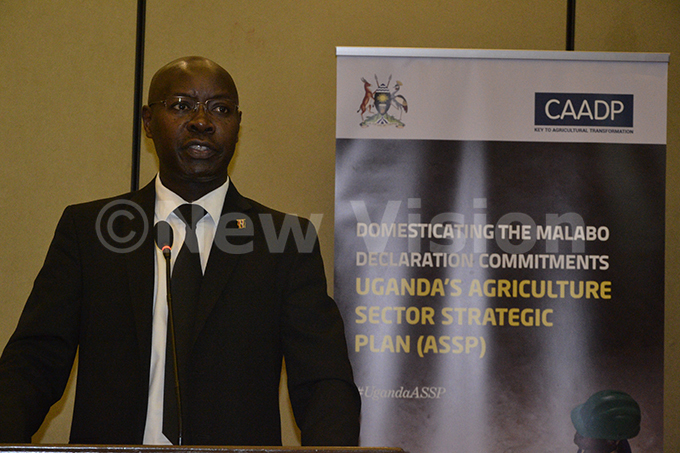Agriculture Ministry reaffirms commitment to African Union Agenda
Mar 02, 2017
This was the focus of a two-day workshop by the Agriculture Ministry in partnership with the African Union Commission and the New Partnership for Africa’s Development (NEPAD) Agency

For the National Development Plan (NDP) II to drive Uganda to the projected middle-income status by 2020, the Agricultural sector stands out as a major driving force.
This was the focus of a two-day workshop by the Agriculture Ministry in partnership with the African Union Commission and the New Partnership for Africa's Development (NEPAD) Agency, Monday to Tuesday.
Focus on the economy, international trade
In his speech at the opening of the workshop, Pius Wakabi Kasajja, the Ministry's Permanent Secretary hinted on the need to further commercialise the sector and target the international market.
"We aim to transform agriculture in Uganda further from subsistence to commercial farming. It holds the greatest potential for attaining inclusive economic growth, employment creation and boosting local, regional and international trade," said Kasajja.
The guidelines from Kasajja preceded the review of Uganda's Agriculture Sector Development Plan (ASSP) to identify opportunities for investment and to align it to the continental Comprehensive African Agricultural Development Programme (CAADP) of the African Union.
 Pius Wakabi Kasajja, the Agriculture Ministry's Permanent Secretary was part of the panel of experts that opened the workshop.
Pius Wakabi Kasajja, the Agriculture Ministry's Permanent Secretary was part of the panel of experts that opened the workshop.
Road to higher food security
Ernest Ruzindaza, Senior Adviser to the AU Commissioner for Rural Economy and Agriculture said that this guided investment will also ensure more food security and faster growth for Uganda in the future.
"We all have a key role to play in energising the agricultural sector of Uganda in a bid to ensure food security, create more employment and accelerate the growth of the country's economy," he said.
Ruzindaza added that the African Union Commission and its agencies will continue to support informed investment in similar ways and monitor it through the biennial reporting which starts in January 2018.
In 2003, Uganda was one of the countries that embraced the CAADP Agenda which calls for among other targets, the increase in public spending on the agricultural sector to at least 10 percent of the national budget.
Ministry committed to deliver
According to the Cabinet Minister Vincent Bamulangaki Sempijja who officially closed the workshop yesterday, the agriculture ministry is committed to delivering the desired CAADP results.
"We will continue to work with the African Union Commission on the progress under CAADP. We also recognise that each country has its own peculiar challenges in the sector and we are addressing these," he said.
Sempijja also pointed out that the CAADP Agenda as one of the pathways to a middle-income status for Uganda, where agriculture contributed 24 percent of the national GDP and 52 percent of total exports earnings in the 2015/16 financial year.
Uganda's focus will be on value chain development for twelve priority commodities including bananas, beans, maize, rice, cassava, tea, coffee, fruits and vegetables, dairy, fish, livestock (meat) and four strategic commodities including cocoa, cotton, oil seeds and oil palm.
The two-day workshop was also attended by representatives of the Japanese International Cooperation Agency (JICA), the United States Agency for International Development (USAID), the Food and Agriculture Organization of the United Nations (FAO), International Fund for Agriculture Development (IFAD), the Alliance for Green Revolution in Africa (AGRA) and the International Food Policy Research Institute (IFPRI).
